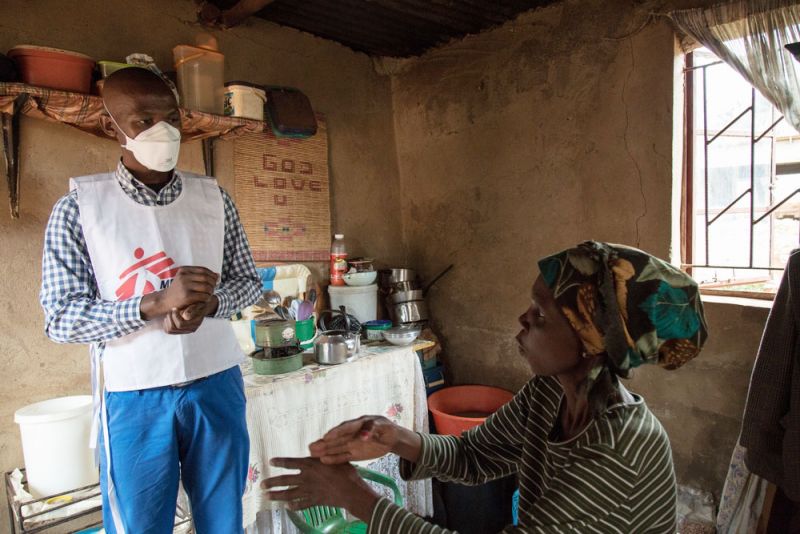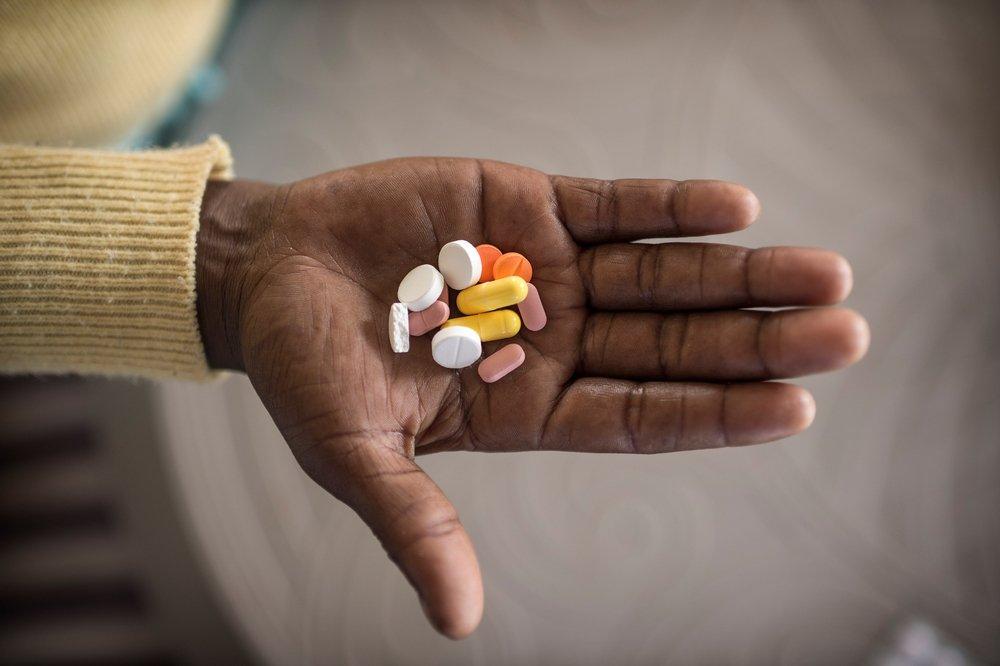What is the endTB trial?
The current standard treatment for MDR-TB is arduous – it can last from 9 to 24 months, and includes a painful daily injection which can cause hearing loss and other serious side-effects in up to 60% of patients. Even worse, standard treatment is only successful in about half of all cases.
The ‘Expand New Drug markets for TB’ (endTB) trial is a phase III randomized controlled trial of five new, all-oral, 9-month treatment regimens for multi-drug resistant tuberculosis (MDR-TB), from which approximately half a million people fall ill with each year, globally. The trial aims to revolutionize MDR-TB treatment through experimental new treatments, by using bedaquiline and delamanid - the first TB drugs to have been developed in almost 50 years - with other oral drugs such as clofazimine, linezolid, fluoroquinolones and pyrazinamide.
The clinical trial is expected to enrol 750 patients across six countries: Kazakhstan, Kyrgyzstan, Lesotho, Peru, Georgia and South Africa.
These are all countries with high TB burdens. The MSF-led endTB trial, which is supported by Harvard Medical School and Epicentre, is part of a bigger project (endTB project) which aims to increase uptake of new TB drugs as part of treatment regimens that are more effective and less toxic. The overall project is run as a partnership between Partners in Health (PIH), Doctors Without Borders (MSF), and Interactive Research & Development (IRD), and financial partner UNITAID.
Is it really the job of NGOs to “revolutionize” MDR-TB treatment? Surely this is the work of governments, standard-setting organizations such as the World Health Organization, and pharmaceutical manufacturers?
You would think that with the development of promising new drugs like bedaquiline and delamanid after such a long period of inactivity in TB drug development that there would have been action from a range of actors but this hasn’t been the case. MSF International president, Dr Joanne Liu has outlined the situation clearly, but in short access to these new drugs remains severely restricted globally and only a fraction of patients who could benefit from the new drugs are able to get them.
The endTB project was launched to help accelerate use of the new drugs in 17 countries facing TB epidemics. South Africa was one of the first countries in the world to register bedaquiline, to train health professionals in its management and to make it accessible to patients and clinicians.
Early introduction of bedaquiline to replace the injectable drugs in patients treated for DR-TB, thus preventing and avoiding the irreversible side-effects of the injections, is a practice that is increasingly implemented by many clinicians in South Africa. However, WHO recommendations on the use of bedaquiline remain limited to patients for whom an effective regimen cannot be constructed due to resistance or intolerance to other drugs in the regimen, and many countries have done little or nothing to facilitate access to these drugs for patients with more complex resistance profiles, such as pre-XDR TB or XDR-TB.
Through the endTB trial MSF and partners aim to build solid scientific evidence on shorter, all-oral regimens, which we believe will be more effective and safe than the current standard of care. Such evidence will be shared, to push governments and manufacturers to take steps to scale up the programmatic use of new drugs.
Is endTB the only trial of this sort happening currently?
MSF is involved in another trial called TB PRACTECAL, which has two trial arms, and which also aims to find new all-oral treatment regimens that are more effective, safer and shorter than current standard treatment. Compared to past years there is more in the research and development pipeline but more research is urgently needed.
Following a patient-centred approach needs to be the focus of all interventions, and we need to keep in mind that patients are not all the same: individualised treatments are often needed, and this is what makes the endTB trial so important, because five new regimens are being studied. The hope is that more than one regimen will show to be safe and effective.
How long will the trial run for?
It will depend on how fast patients will be enrolled. Estimations are that patient enrolments will finish in 2020 - which means initial results will come through around 2021-2022.
How many participants will the trial take?
750 patients in total across all sites. Khayelitsha aims to enrol between 90-120 MDR-TB patients over two years
Do people enrolled in the trial have to be from Khayelitsha, or have to live in Khayelitsha?
The patients don’t have to be from Khayelitsha but have to be living in Khayelitsha for the period of the trial, to ensure proper follow-up and to be able to respect the rigorous monitoring schedule in place in the trial
Isn’t there anything that can be done now to eliminate the injectable?
Yes! In countries like South Africa, clinicians are already able to replace the injectable agent with a new drug, mostly bedaquiline, at a very early stage of treatment, and as soon as DR-TB patients experience any side effects, notably hearing loss or and renal toxicity. And this can be done in the context of the standard treatment period of 20-24 months but also in patients started on the 9 month short-course MDR-TB treatment regimen recommended by the WHO in 2016, and rolled out in South Africa last year.

Given the increasing existence of encouraging evidence on the use of these new drugs, there would be valid reasons for the South African Department of Health to allow doctors the option to start patients on DR-TB regimens with the new drugs at the start of treatment, in order to avoid unnecessary human suffering, and especially in the most vulnerable populations, such as people living with HIV, children and adolescents.
We are alsocalling on clinicians from other countries to follow the example of South Africa, and accelerate the replacement of the injectable with new drugs in very early stages of treatment, and certainly before the onset of irreversible and sometimes life-threatening side-effects that the injections are known to cause.
Is there anything special about the Khayelitsha trial site?
The Khayelitsha site is special in that all enrolled patients will receive treatment at primary health care facilities rather than central hospitals. This is in line with the South African public health system’s successful model of decentralised DR-TB care – a model that MSF in Khayelitsha has worked with Western Cape health authorities at length to exemplify. Decentralized care allows patients to access treatment closer to their homes, and has drastically reduced the time it takes for DR-TB patients to start on treatment after receiving their diagnosis.
How will the experience of patients enrolled in the Khayelitsha endTB trial differ from that of other MDR-TB patients in South Africa?
The provision of care will be of a very high standard: intensive monitoring and follow-up processes, and a full package of patient support, so on the one hand there is some privilege, but on the other itis an act of courage and trust to be a part of the trial, I think. We believe, based on current evidences on the drugs that will be used in the different arms, that the experimental regimens that enrolled patients will receive will be more effective, and safer, than the current regimen. However, they remain experimental.
When will the Khayelitsha arm of the trial be launched?
The first patients were enrolled in the endTB trial in April, and currently enrolment is proceeding well, with a handful of patients already initiated on treatment. However, the official trial opening ceremony will take place on 17 May at Town Two clinic in Khayelitsha - an event that will be attended by senior City of Cape Town and Western Cape Provincial government officials, as well as current and cured MDR-TB patients and members of the Khayelitsha communit
Expand new drug markets for TB (endTB) is a partnership between Partners in Health, Médecins Sans Frontières, Interactive Research & Development and financial partner UNITAID. Epicentre, Harvard Medical School and the Institute of Tropical Medicine Antwerp are partners of the clinical trial.
As of May 2018, there are 98 patients enrolled across five countries, namely Georgia, Kazakhstan, Lesotho, Peru and South Africa. For more information go to: www.endtb.org/clinical-trial
MSF treatment of DR-TB and XDR-TB in South Africa
MSF supports access to new and re-purposed drugs for strengthening DR-TB treatment regimens in Khayelitsha, Western Cape (since 2007) and in Eshowe & Mbongolwane, KwaZulu-Natal (since 2017). The provision of new drugs such as bedaquiline and delamanid goes hand in hand with the decentralization of DR-TB care to the primary healthcare level, so that treatment initiation and access to drugs and patient support can occur closer to the communities where DR-TB patients live.
Find out more about MSF's work in South Africa.
